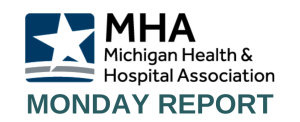
Healthcare Worker Safety Bills Signed into Law
Gov. Whitmer signed into law Dec. 6 House Bills 4520 and 4521, which increase the penalties for assaulting a healthcare worker or volunteer. Now referred to as Public Acts 271 and 272 of 2023, the …
Psychiatric Residential Treatment Facility Final Policy in Effect
The Michigan Department of Health & Human Services recent policy for Psychiatric Residential Treatment Facilities went into effect Dec. 1, 2023. Initially released for comment in May 2023, the MHA provided feedback on …
 LARA Task Force on FTMPs Releases Report
LARA Task Force on FTMPs Releases Report
In a response to the growing need for qualified healthcare professionals, the Michigan Department of Licensing and Regulatory Affairs (LARA) released a comprehensive report aimed at addressing the challenges faced by Foreign Trained Medical Professionals …
MDHHS Releases Outpatient Hospital 340B Billing Final Policy
The Michigan Department of Health and Human Services (MDHHS) recently released a final policy to modify hospital outpatient billing requirements for drugs purchased through the 340B drug pricing program. Existing policy requires 340B hospitals to …
The MHA released a new episode of the MiCare Champion Cast, which features interviews each month with experts in Michigan discussing key issues that impact healthcare and the health of communities. The December 2023 episode, …
The Keckley Report
“CSOs know that hospitals are at a crossroad, particularly not-for-profit system operators accountable to the communities they serve. In the 4Q Keckley Poll, 55% agreed that “the tax exemption given not-for-profit hospitals is justified by the community benefits they provide” but 45% thought otherwise. They concede their competitive landscape is more complicated as core demand shifts to non-hospital settings and alternative treatments and self-care become obviate traditional claims-based forecasting. They see the bigger players getting bigger: last week’s announcements of the Cigna-Humana deal and expansion of the Ascension-LifePoint relationship cases in point. And they recognize that their reputations are under assault: the rift between Modern Healthcare and the AHA over the Merritt Research ’s charity care study (see Hospital section below) is the latest stimulant for not-for-profit detractors. …”
 News to Know
News to Know
- The MHA welcomes ModusOne Health as a new Endorsed Business Partner and the only physician-founded and physician-run Clinical Diagnosis Improvement company that delivers robust monthly leaderboard-style reporting of provider accuracy in diagnosing patients on the conditions that most directly affect quality metrics and reimbursements.
- Due to the holidays, Monday Report will not be published Dec. 25 and Jan. 1, and will resume its normal schedule Jan. 8.
 MHA in the News
MHA in the News
The MHA received media coverage the week of Dec. 4 on a new law signed by Gov. Whitmer that increase the penalties for assaulting a healthcare worker or volunteer, as well as stories on expanded …


 LARA Task Force on FTMPs Releases Report
LARA Task Force on FTMPs Releases Report MHA Podcast Covers the Latest on Flu Vaccines and Pediatric Respiratory Illness in Michigan
MHA Podcast Covers the Latest on Flu Vaccines and Pediatric Respiratory Illness in Michigan Health System Chief Strategy Officer Roundtable Assessment: ‘The Near-Term is Tough, the Long-Term is Uncertain and the Deck is Stacked against Hospitals’
Health System Chief Strategy Officer Roundtable Assessment: ‘The Near-Term is Tough, the Long-Term is Uncertain and the Deck is Stacked against Hospitals’ News to Know
News to Know MHA in the News
MHA in the News

